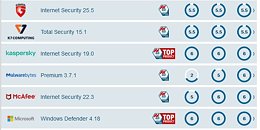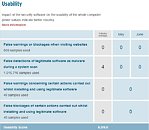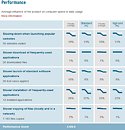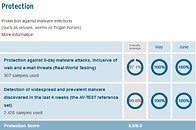Tuesday, August 13th 2019
A Case for Windows Defender: Triad of Perfect Scores in AV-Test
Here's a strange thing: a case for a free, bundled software solution being better (in the metrics concerned and evaluated) than paid, third-party counterparts. We're writing of none other than Microsoft's own Windows Defender suite, which is bundled with Windows and offers a security solution integrated into your OS. While the "paid is always better" philosophy has been proven wrong time and again and isn't that much of a powerhouse behind users' thought process anymore, the fact is that Windows Defender has somewhat been taken for granted as an "undesirability" in users' computers. However, a comparison made by AV-Test, which pits many of the available cybersecurity solutions available on the market, has found Microsoft's Windows Defender to be worthy of a triad of perfect scores.
The results for Windows Defender include perfect (6.0) scores in the "Protection", "Performance" and Usability" categories. The testing period refers to May through June of this year, and only F-Secure SAFE 17, Kaspersky Internet Security 19 and Norton Security 22.17 managed to get the same perfect scores as Windows Defender Version 4.18. Check out the link for the score of your cybersecurity solution of choice. But it's clear that least where this period is concerned, Windows Defender walked circles around some paid solutions.
Source:
AV-Test
The results for Windows Defender include perfect (6.0) scores in the "Protection", "Performance" and Usability" categories. The testing period refers to May through June of this year, and only F-Secure SAFE 17, Kaspersky Internet Security 19 and Norton Security 22.17 managed to get the same perfect scores as Windows Defender Version 4.18. Check out the link for the score of your cybersecurity solution of choice. But it's clear that least where this period is concerned, Windows Defender walked circles around some paid solutions.




43 Comments on A Case for Windows Defender: Triad of Perfect Scores in AV-Test
macOS is almost 20 (older if you count its BSD roots) and has also been less trouble than that.
The API changes of the Linux kernel are even worse for drivers that are binary blob only modules like many Broadcom drivers. If you look at such open source projects like TomatoUSB, OpenWRT, etc. you'll notice that many of those projects are based upon positively ancient versions of the Linux kernel with security fixes often patched in and otherwise merged in all the while hoping that those fixes don't break the Broadcom binary blob drivers that many home routers use to power their more proprietary internal devices such as WiFi, Ethernet switch, etc.
It's also why updating Android devices is such a royal pain in the ass as well, many of the drivers that power the more proprietary pieces of the hardware like the Snapdragon, the cellular baseband chip, etc. are often found as binary blob only modules. If you decide to just willy nilly update the kernel you'll often find that everything just breaks in a very horrible way.
Microsoft doesn't change stuff like that, they have prided themselves on the idea that if you make a program or drivers for Windows 7 it'll (at least with a 95% chance) work on Windows 10 with relatively no issues. Sure, you might need to go in and change stuff and tweak a few things but that's about it; it'll work for the most part. Unfortunately, that backward compatibility has become a double-edged sword. On one side it helps maintain a very structured and dependable software, driver, and hardware ecosystem that's unmatched by any other OS on the market. But on the other side it makes for maintaining it to be a royal pain in the ass.
Another negative aspect of the 3rd party option is that they can be as much as twice as costly to renew that to buy as a new customer. So say for a family of 5 users .... Dad buys in 2017 for 3 years ($7.50 per seat per year) and them Mom buys in 2020.
For me, aside from a 100% detection rate in monthly tests over 2 years, it's the added value that the 3rd party options provide.
Many are listed in preceding post but for example, have the option to ...
... set definition update frequency (Defender last updated 4 days ago)
... Postpone scans when gaming or high CPU / file usage negating and system performance impacts
After all these years of foisting itself as a truly "adequate" solution, in the last 3 months Defender has become what it should have been from the getgo. As long as they can maintain this level of performance... and reduce the false positives while maintaining performance above the industry average, it will remain a viable option. That being said, it does not provide equivalent value to 3rd party options which provide additional features and benefits. Of course the value to any individual will depoend on whether those extra features have any value ...
-Do you want scans paused while gaming or PC / storage subsystems are under heavy usage or battery level is low on the lappie ?
-Does any of the mail / web based tracking and protections provide any value ?
-Does the application software vulnerability and update tracking w/ auto update options provide any value ?
-Does the free cloud storage for backups provide any value ?
Like anything else, it's wise to investigate the value of available alternatives .... free is not always the best value when risk and time is involved. What makes the most sense will depend on each individual situation. The only wrong choice is not fully evaluating your options.